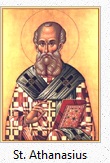|
|
|

From
a discourse by Saint Athanasius, bishop
On the incarnation of the Word
 he Word of God,
incorporeal, incorruptible and immaterial, entered our world. Yet it was not
as if He had been remote from it up to that time. For there is no part of the
world that was ever without His presence; together with His Father, He continually
filled all things and places. he Word of God,
incorporeal, incorruptible and immaterial, entered our world. Yet it was not
as if He had been remote from it up to that time. For there is no part of the
world that was ever without His presence; together with His Father, He continually
filled all things and places.
 Out of His loving-kindness for
us He came to us, and we see this in the way He revealed Himself openly to
us. Taking pity on mankind’s weakness, and moved by our corruption,
He could not stand aside and see death have the mastery over us; He did not
want creation to perish and His Father’s work in fashioning man to be
in vain. He therefore took to Himself a body, no different from our own,
for he did not wish simply to be in a body or only to be seen. If He had
wanted simply to be seen, He could indeed have taken another, and nobler, body.
Instead, He took our body in its reality. Out of His loving-kindness for
us He came to us, and we see this in the way He revealed Himself openly to
us. Taking pity on mankind’s weakness, and moved by our corruption,
He could not stand aside and see death have the mastery over us; He did not
want creation to perish and His Father’s work in fashioning man to be
in vain. He therefore took to Himself a body, no different from our own,
for he did not wish simply to be in a body or only to be seen. If He had
wanted simply to be seen, He could indeed have taken another, and nobler, body.
Instead, He took our body in its reality.
Within the Virgin He built Himself
a temple, that is, a body; He made it His own instrument in which to dwell
and to reveal Himself. In this way He received from mankind a body like our
own, and, since all were subject to the corruption of death, He delivered
this body over to death for all, and with supreme love offered it to the
Father. He did so to destroy the law of corruption passed against all men,
since all died in him. The law, which had spent its force on the body of
the Lord, could no longer have any power over His fellowmen. Moreover, this
was the way in which the Word was to restore mankind to immortality, after
it had fallen into corruption, and summon it back from death to life. He
utterly destroyed the power death had against mankind—as fire consumes
chaff—by means of the body He had taken and the grace of the
resurrection. . . .
—Saint Athanasius, bishop
Office of Readings, May 2
|




 Out of His loving-kindness for
us He came to us, and we see this in the way He revealed Himself openly to
us. Taking pity on mankind’s weakness, and moved by our corruption,
He could not stand aside and see death have the mastery over us; He did not
want creation to perish and His Father’s work in fashioning man to be
in vain. He therefore took to Himself a body, no different from our own,
for he did not wish simply to be in a body or only to be seen. If He had
wanted simply to be seen, He could indeed have taken another, and nobler, body.
Instead, He took our body in its reality.
Out of His loving-kindness for
us He came to us, and we see this in the way He revealed Himself openly to
us. Taking pity on mankind’s weakness, and moved by our corruption,
He could not stand aside and see death have the mastery over us; He did not
want creation to perish and His Father’s work in fashioning man to be
in vain. He therefore took to Himself a body, no different from our own,
for he did not wish simply to be in a body or only to be seen. If He had
wanted simply to be seen, He could indeed have taken another, and nobler, body.
Instead, He took our body in its reality.